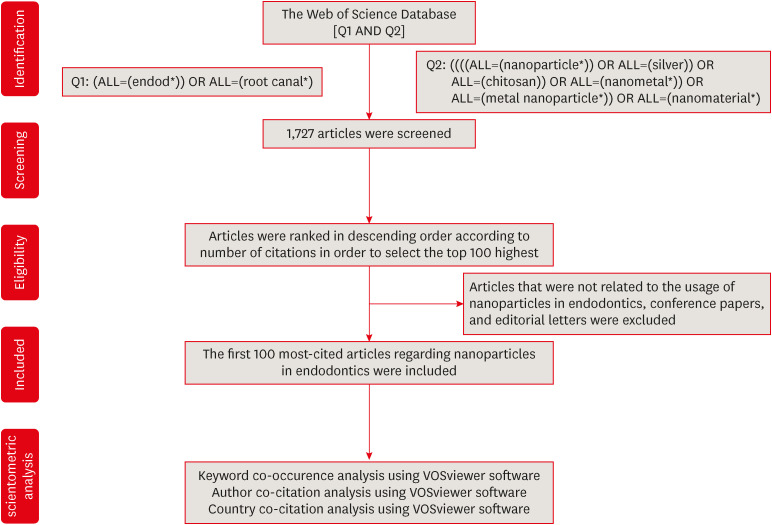-
Contemporary research trends on nanoparticles in endodontics: a bibliometric and scientometric analysis of the top 100 most-cited articles
-
Sıla Nur Usta, Zeliha Uğur-Aydın, Kadriye Demirkaya, Cumhur Aydın
-
Restor Dent Endod 2023;48(3):e27. Published online July 26, 2023
-
DOI: https://doi.org/10.5395/rde.2023.48.e27
-
-
 Abstract Abstract
 PDF PDF Supplementary Material Supplementary Material PubReader PubReader ePub ePub
- Objectives
Advancements in nanotechnology have led to the widespread usage of nanoparticles in the endodontic field. This bibliometric study aimed to determine and analyze the top 100 most-cited articles about nanoparticles in endodontics from 2000 to 2022. Materials and MethodsA detailed electronic search was conducted on the “Clarivate Analytics Web of Science, All Databases” to receive the most-cited articles related to the topic. Articles were ranked in descending order based on their citation counts, and the first 100 were selected for bibliometric analysis. Parameters such as citation density, publication year, journal, country, institution, author, study design, study field, evidence level, and keywords were analyzed. ResultsThe top 100 most-cited articles received 4,698 citations (16–271) with 970.21 (1.91–181) citation density in total. Among decades, citations were significantly higher in 2011–2022 (p < 0.001). Journal of Endodontics had the largest number of publications. Canada and the University of Toronto made the highest contribution as country and institution, respectively. Anil Kishen was the 1 who participated in the largest number of articles. The majority of the articles were designed in vitro. The main study field was “antibacterial effect.” Among keywords, “nanoparticles” followed by “Enterococcus faecalis” were used more frequently. ConclusionsDevelopments in nanotechnology had an impact on the increasing number of studies in recent years. This bibliometric study provides a comprehensive view of nanoparticle advances and trends using citation analysis.
-
Citations
Citations to this article as recorded by  - Research trends and mapping knowledge for maxillary sinus augmentation in oral and maxillofacial surgery
Özlem Saraç Atagün, Şeyma Çardakcı Bahar, Seval Ceylan Şen, Gülbahar Ustaoğlu
Journal of Stomatology, Oral and Maxillofacial Surgery.2025; 126(4): 102116. CrossRef - Exploring vital pulp Therapies: A bibliometric analysis of the most cited articles
Gustavo Henrique Sousa, Rodolfo Lima Gonçalves, Barbara Figueiredo, Vilton Cardozo Moreira Dias, Ana Carolina Soares Mendes, Valéria de Cássia Bueno Melo, Adriana Guimarães Rodrigues, Hebertt Gonzaga dos Santos Chaves
The Saudi Dental Journal.2024; 36(5): 778. CrossRef - The cutting-edge roles of lasers in endodontics: A bibliometric and scientometric analysis of the 100 most-cited articles
Sıla Nur Usta, Pablo Betancourt, Alper Ceylan, Cangül Keskin
Lasers in Medical Science.2024;[Epub] CrossRef
-
341
View
-
8
Download
-
3
Web of Science
-
3
Crossref
|




